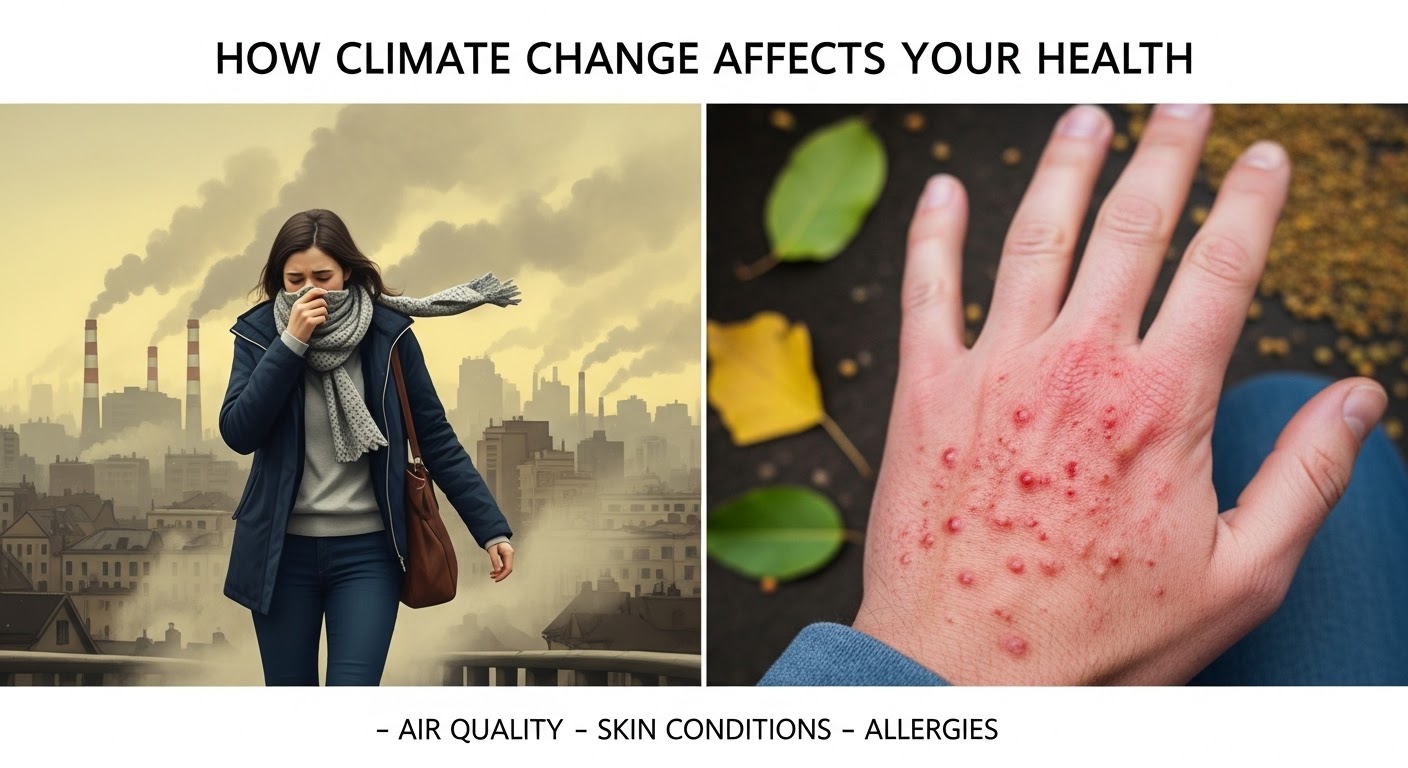ugh the lens of rising sea levels, stronger storms, and melting glaciers. But one of its most immediate and personal impacts is on our health. As global temperatures rise and weather patterns shift, the quality of the air we breathe, the condition of our skin, and the severity of allergies are all being affected — often in ways we don’t expect.
1. Air Quality and Respiratory Health
🔥 Pollution and Wildfires
As temperatures rise, so do levels of ground-level ozone — a major component of smog. Additionally, wildfires are becoming more frequent and severe, releasing large amounts of harmful smoke and fine particulate matter (PM2.5) into the air.
Health Effects:
-
Asthma attacks and increased asthma prevalence
-
Chronic bronchitis and lung irritation
-
Increased risk of lung infections
-
Reduced lung function in children and the elderly
🌫️ Urban Heat Islands
Cities often become “heat islands,” trapping hot air and pollutants. This creates poor air quality days, which particularly impact people with pre-existing respiratory conditions.
Tip: Check local air quality indexes (AQI) daily and limit outdoor activity during high-pollution days.
2. Skin Health and Climate Change
🌞 Increased UV Exposure
Climate change affects cloud cover and the ozone layer, increasing UV radiation exposure. Even small changes in UV levels can have a large impact on your skin.
Health Effects:
-
Higher risk of skin cancers like melanoma
-
Accelerated skin aging (wrinkles, fine lines)
-
Sunburn and skin inflammation
💧 Dehydration and Dry Skin
Rising temperatures and reduced humidity can dry out your skin, especially in arid and urban areas. Climate shifts can also worsen skin conditions such as eczema and psoriasis.
Tip: Hydrate, moisturize daily, and use a broad-spectrum sunscreen (SPF 30+).
3. Climate Change and Allergies
🌿 Longer Allergy Seasons
Warmer temperatures lead to longer growing seasons for plants like ragweed and grasses. This means more pollen in the air — and for a longer time.
Health Effects:
-
Increased hay fever (allergic rhinitis)
-
More intense allergy symptoms (sneezing, itchy eyes, congestion)
-
Cross-reactions with food allergies in some cases
🌳 Stronger Allergens
Climate change doesn’t just make allergy seasons longer — it makes them worse. Plants exposed to higher CO₂ levels produce more potent allergens.
Tip: Keep windows closed during peak pollen times, and use air purifiers indoors.
4. Vulnerable Populations at Greater Risk
Certain groups are more vulnerable to climate-related health issues:
-
Children
-
Elderly adults
-
People with chronic conditions (asthma, cardiovascular disease)
-
Outdoor workers
-
Low-income communities with limited access to healthcare
Awareness and preparedness are key to reducing these risks.
5. Protecting Your Health in a Changing Climate
✅ What You Can Do:
-
Monitor air quality: Use apps like AQICN or AirNow.
-
Stay hydrated and wear sunscreen.
-
Use HEPA filters in your home and workplace.
-
Support green policies and reduce your carbon footprint.
-
Consult your doctor about managing allergies and skin conditions during seasonal changes.
Conclusion
Climate change is no longer a distant threat — it’s a current and pressing public health issue. From the air we breathe to the condition of our skin and severity of allergies, it affects us on a deeply personal level. By staying informed and making simple lifestyle adjustments, you can reduce its impact on your health and support a healthier planet for future generations.

